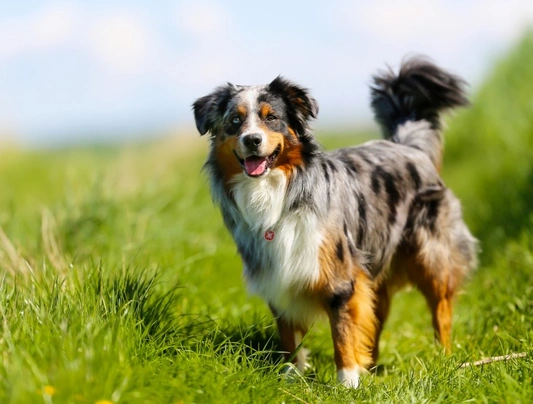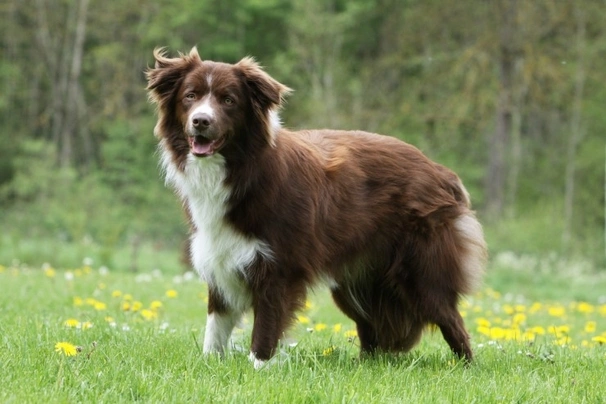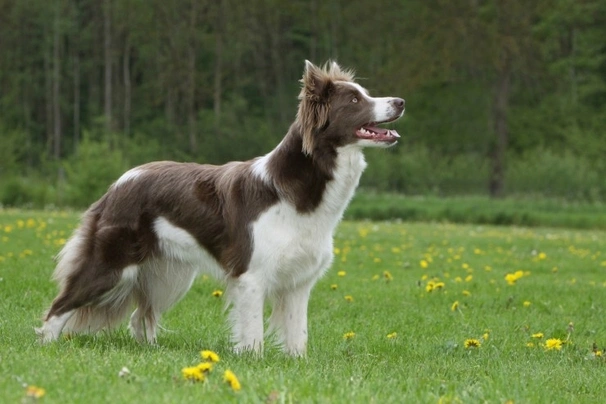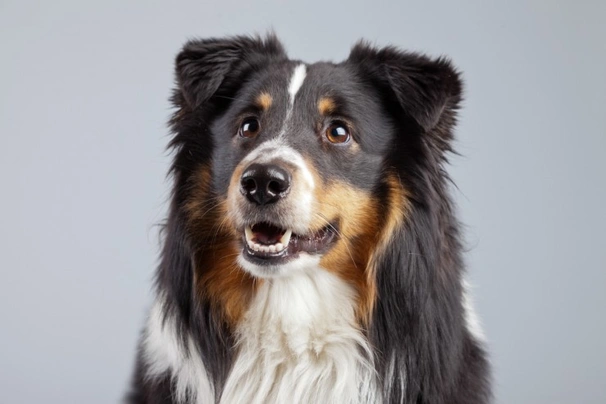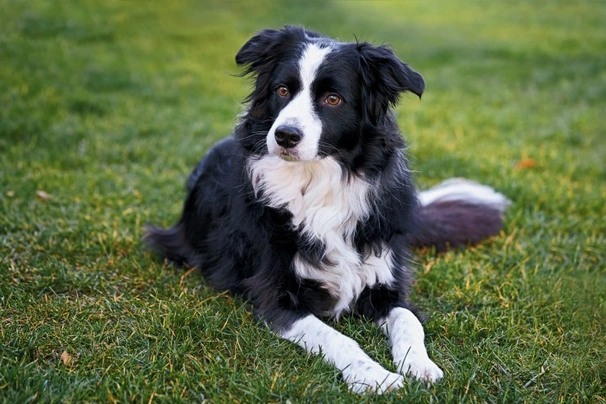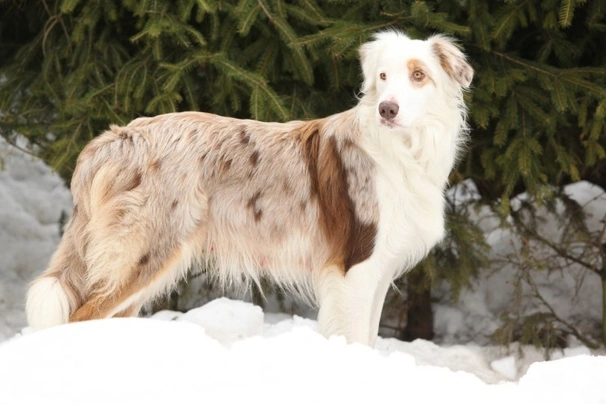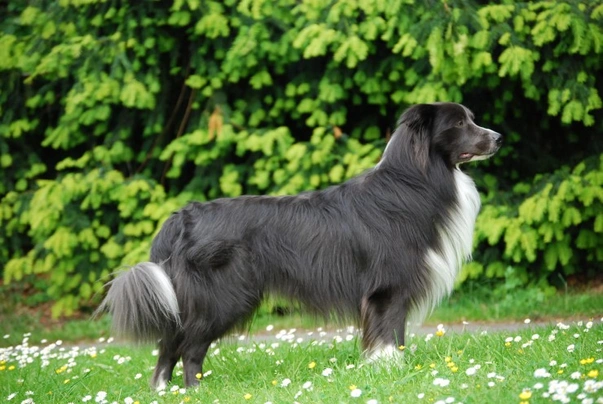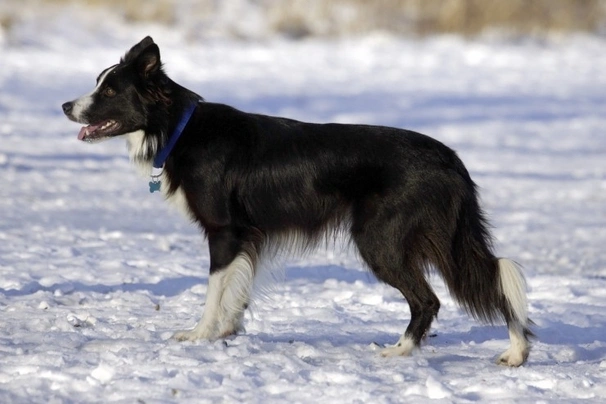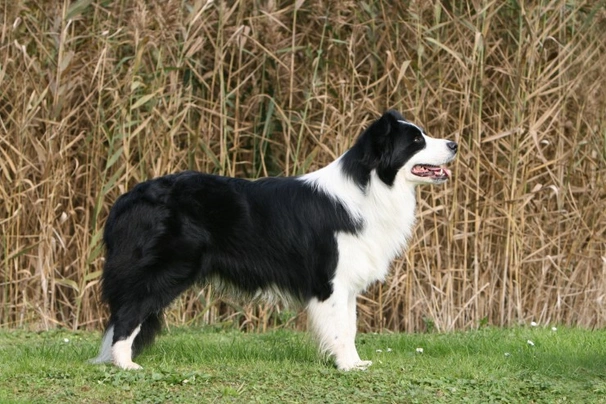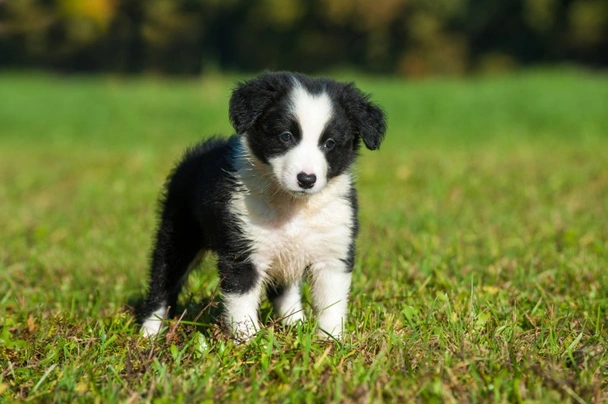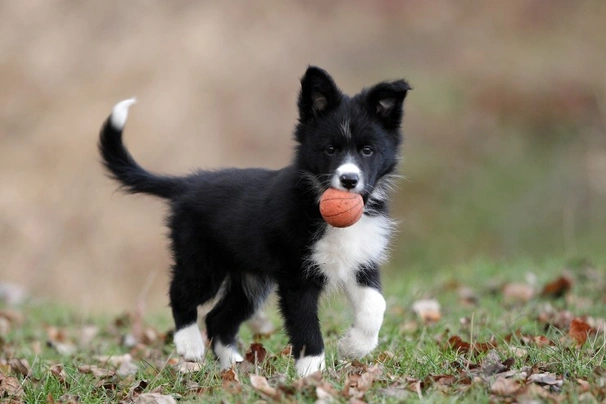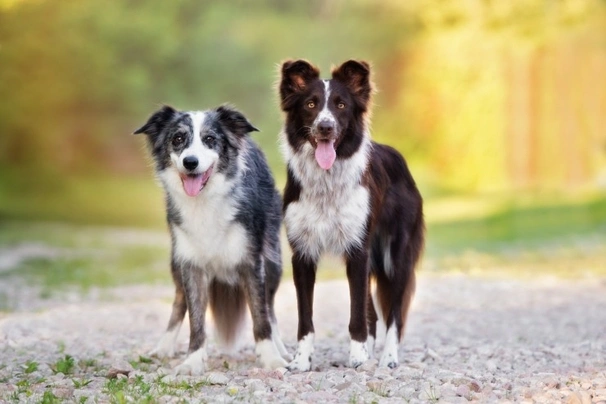Pets
Pets for studWanted petsBreedersAccessories & services
Knowledge hub
Support
Support & safety portalBorder Collie
Pros
Cons
Introduction of the Border Collie
The Border Collie is one of the most intelligent dogs on the planet ranking number one out of seventy-nine other breeds. For generations the Border Collie has worked alongside shepherds both here in the UK and elsewhere in the world and have always been highly prized for being supreme working and companion dogs more especially suited to people who lead active outdoor lives. Border Collies are tenacious while at the same time being one of the most versatile breeds in the world.
Known to be the finest herding dog on the planet Border collies are athletic and energetic characters that like nothing better than being given things to do even in a home environment. Interestingly all modern day Border Collies are direct descendants of one tri-colour dog called Old Hemp a Border Collie bred by Adam Telfer that gained himself the reputation of being supremely good at the job he was bred to do.
History of the Border Collie
As their name suggests the Border Collie originates in the county of Northumberland on the Scottish Borders. They were bred to be herding dogs and more especially to work with shepherds and flocks of sheep. Their name was first used during the 1900s when James Reid the Secretary of the International Sheep Dog Society registered these dogs as Border Collies so they could be differentiated from other collie breeds already registered on his list.
These hardworking dogs have always been highly regarded for not only their intelligence but also for their innate ability to herd flocks. The breed was first mentioned and recorded in dog trials held in North Wales in 1873 but it took another 30 or so years until a Border Collie registry was established namely the International Sheep Dog Society (ISDS).
A dog called Old Hemp won top prize at the North Wales show thanks to his intelligence and the way he worked sheep. He went on to win many top competitions around the country and to sire many of the best Border Collies around at the time. As previously mentioned all modern Border Collies are descendants of Old Hemp.
Border Collies were first recognised by the Kennel Club as being a pedigree breed in 1977 when the first breed standard was established. This was then amended a year later in 1978 and has remained in place pretty much as it was first written right up until today. There are in fact two independent registries for Border Collies with the International Sheep Dog Society being the one that promotes the working Border Collie and the Kennel Club which promotes good breeding practices to standardise a dog's appearance.
Today Border Collies can be found working in many other countries of the world and they are also a popular choice as companion dogs and family pets thanks to their lovely honest and energetic natures. The Border Collie is renowned for their willingness to work alongside people which is another reason why the breed is considered being one of the most popular working dogs on the planet.
The breed breaks the norm when it comes to the saying "Jack of all trades but master of none" because the Border Collie is so versatile and so successful in many disciplines. This includes working as PAT dogs in rescue and as sniffer dogs all of which are tasks that the Border Collie excels at.
Interesting facts about the breed
- Are Border Collies a vulnerable breed? No they are one of the most popular dogs throughout the world and are ranked 12th in the UK
- Border Collies are one of the most intelligent breeds on the planet
- All Border Collies today can trace their ancestry back to a highly intelligent dog called Old Hemp
- Border Collies are one of the most versatile dogs in the world
- They are considered the best herding dogs in the world
- Border Collies make excellent PAT dogs
- Robert Burns owned a Border Collie called Luath and he wrote a poem about him on his death
- The American Kennel Club only recognised the breed in 1995
Appearance of the Border Collie
Height at the withers: Males 48 - 56 cm Females 46 - 53 cm
Average weight: Males 14 - 20 kg Females 12 - 19 kg
Border Collies are very graceful dogs always on the alert and ready to obey commands they are given whether as a working dog or in a home environment. Providing they are given the correct amount of exercise and mental stimulation on a daily basis Border Collies make wonderful family pets. They are medium in size and boast double coats with some dogs have luxurious wavy coats and others having slicker finer ones. Border Collies come in an array of colours but the most recognised dogs the world over are those that boast black and white coats with a white blaze a white collar and white on their legs.
Border Collies boast broad heads with a very distinct stop and tapering muzzle. They have black noses except if they have brown or chocolate coats when their noses are brown in colour. Dogs with blue coats have slate coloured noses but all dogs have well developed nostrils. Their oval eyes are set wide apart on a dog's head and are brown with the exception of Merles when one or both of their eyes can be blue. Sometimes just part of a merle’s eyes is blue but all Border Collies boast a very keen intelligent and mild look in their eyes whether they are working or at when they are at rest.
Their ears are medium in size and set well apart on a dog's head which they carry either erect or semi-erect. Their mouths are strong and dogs boast a perfect scissor bite where their upper teeth neatly overlap their lower ones. A Border Collie has a strong muscular neck that they hold slightly arched and which is wider at the shoulder than the nape.
Their forequarters are strong and well boned with well laid back shoulders and nice straight front legs. They boast athletic looking bodies with well sprung ribs and a deep chest over deep muscular loins. The hindquarters are muscular with well-developed thighs and back legs. Their feet are oval in shape with deep pads tight arched toes and short nails.
Border Collies have quite long tales that are set low and which are well covered in hair and which have a slight curve in them right to the tip all of which adds to the perfect balance and proportions of these dogs. When excited a Border Collie will raise their tale but they never carry them over their backs.
When it comes to their coats Border Collies can either have quite long hair or their coats are short and smooth. Both types have a very dense topcoat and softer undercoat which offers dogs a lot of protection against the elements. Long-coated dogs have longer hair around their necks and upper shoulders which forms a mane and they have feathers on their legs and under their tails.
Border Collies as previously mentioned come in a variety of colours and combinations of colours with the most recognisable being the black and white dog. However other colours include the following:
- Black & White
- Black Tricolour
- Black White & Tan
- Blue & White
- Blue Merle
- Blue Merle & Tan
- Blue Merle & White
- Blue Sable
- Blue Sable & White
- Blue Tricolour
- Blue Tricolour Merle
- Blue White & Tan
- Brown & White
- Brown Merle
- Brown Merle & White
- Brown Sable
- Brown Sable & White
- Brown Tricolour
- Brown Tricolour Merle
- Brown White & Tan
- Chocolate & White
- Cream
- Gold
- Gold & White
- Gold Merle & White
- Gold Sable
- Gold Sable & White
- Lilac
- Lilac & White
- Lilac Merle
- Lilac Merle & White
- Lilac Tricolour
- Lilac Tricolour Merle
- Red & White
- Red Merle & White
- Red Tricolour
- Red Tricolour Merle
- Red White & Tan
- Sable
- Sable & White
- Sable Blue Merle
- Sable Merle
- Sable Merle & White
- Seal
- Seal & White
- Slate
- Slate & White
- Slate Merle
- Slate Merle & White
- Slate Tricolour Merle
It is worth noting that any white in a Border Collies coat must never be the predominant colour in a dog’s coat under the Kennel Club Breed Standard.
Border Collies come in other colours too but these are not recognised by the Kennel Club and as such they are thought of as being "undesirable" as it would mean a dog has been outcrossed to another breed which could have an adverse effect on their health. Any Border Collie with an undesirable colour would be refused registration.
Gait/movement
Border Collies are tireless and move freely and smoothly with the minimum of effort which gives them the appearance of both speed and stealth.
Faults
Under the Kennel Club Breed Standard any departures from the standard would be considered as faults with the seriousness of a fault being judged on how much it affects the well-being and health of a dog and their ability to work.
Male Border Collies must have two normal testicles fully descended and if they are not this would be deemed a fault.
It is also worth noting that the size given in a Border Collies KC breed standard is to be used as a guide only. As such a Border Collie may be slightly larger or smaller and weigh a little less or more than stated in their breed standard.
Temperament of the Border Collie
Border Collies are considered the most intelligent dogs on the planet boasting an extremely strong instinct to work alongside man they are always ready and alert to any commands they are given. This makes the breed highly trainable and Border Collies have proved themselves not only in the working environment herding flocks of sheep but as search and rescue dogs tracker and sniffer dogs too. They are always a firm favourite in the show ring and boast an impressive track record for winning at many canine sporting activities which includes agility.
They need a lot of exercise and mental stimulation to be truly happy well-rounded and well-behaved dogs. They are never happier than when they are working or being given something to do. They are not a good choice for people who lead a more sedentary indoor life because Border Collies are high maintenance in the exercise department. With this said they are the perfect choice for people and families who lead busy outdoor lives where a canine companion would fit in perfectly with their lifestyle.
A Border Collie's training needs to start as early as possible and they need to be well socialised from a young age too. Trainers love these dogs because they are so responsive to commands and because they learn new things exceptionally quickly. There is of course a downside to their intelligence which is they are just as quick to pick up bad habits as they are the good. Providing they are given the right sort of direction and guidance from the word go Border Collies are a pleasure to live with but if they get the better of an owner they can make life in the home very difficult indeed.
Border Collies like to know their place in the pack and who is the Alpha Dog in a household or they might start displaying a more dominant side to their character which is something to be avoided at all costs. The result is an unruly hard to manage and unhappy dog that’s hard to handle. They also tend to form a very strong bond with one person in a household although always friendly and affectionate to the rest of the household.
Being so intelligent means that Border Collies are quick to learn how to open cupboards and doors something potential owners need to be aware of or they might feed their pet helps themselves to a lot of things which includes food they should not really eat. If they are left to their own devices for long periods of time boredom quickly sets in and dogs find their own way of amusing themselves which includes chasing people cars bicycles and anything else that takes their fancy. Other behavioural problems that develop when dogs are left on their own for long periods of time include being destructive around the house pacing up and down which is a sure sign of a Border Collie being unhappy and bored.
Are they a good choice fo first time owners?
Border Collies are not the best choice for first time dog owners simply because their needs are so specific and they tend to be quite demanding in many ways. They are better suited to people familiar with the breed and who have the time needed to dedicate to an extremely intelligent and active canine companion.
What about prey drive?
Border Collies were bred to herd and it's a trait that's deeply embedded in a dog's psyche. They have a high prey drive and will chase an animal whether large or small not necessarily to hurt it but because they feel the need to "control" anything they herd or chase. With this said it would be a mistake to let a Border Collie run free anywhere near livestock unless they have been extremely well trained and respond to the "recall" command in an instant.
What about playfulness?
Border Collies have a playful streak in them and thrive on playing interactive games. They excel at many canine sports which includes activities like flyball agility and obedience to name but three. They remain playful right into their golden years which is another reason they are so entertaining around the home and fun to live with.
What about adaptability?
Border Collies thrive in an environment where they have plenty of space to express themselves as they should. They are not suited to apartment living unless they are in their golden years and need less in the way of daily exercise but they would still need a lot of mental stimulation to be truly happy dogs even when they reach their senior years.
What about separation anxiety?
Some Border Collies do suffer from separation anxiety because they form such strong ties with their owners which is why they are better suited to households where at least one person remains at home when everyone else is out.
What about excessive barking?
A bored Border Collie would develop unwanted behavioural issues one of which is barking incessantly to get some attention. It would be fair to say that some Border Collies can be "barkers" whereas others are not. The key to curbing this type of behaviour in such an active energetic dog is to make sure they are given lots of mental stimulation and daily exercise. A tired Border Collie is a "good" Border Collie which describes the breed perfectly.
Do Border Collies like water?
Some Border Collies love being in and around water whereas others don't like to get their feet wet. Most dogs that do like water are good swimmers but care should always be taken when any dog is being walked near any of the more dangerous water courses just in case they decide to leap in.
Are Border Collies good watchdogs?
Border Collies can be quite territorial and therefore can be quick off the mark to let an owner know when strangers are about or when something they don't like is going on in their environment.
Intelligence / Trainability of the Border Collie
The Border Collie is at the top of the list when it comes to intelligence with an added bonus being that these active and lively dogs like to please. Rarely do Collies get it wrong once they are shown or taught what to do. They may be hyperactive characters but this not mean they cannot focus on an owner during a training session and they thrive on the one to one contact they are given too. They are after all "eye dogs" and when they focus on an owner or handler it is usually very hard to break a dog's focus.
However like all dogs a Border Collie's training and education must start early for them to be truly well-rounded dogs. Socialising a Collie from a young age is essential. They respond incredibly well to positive reinforcement but their training must be consistent and always fair. Dogs need understand their place in a pack and who is alpha dog in a household or they may become unruly and hard to handle. Border Collies are never happier than when they know who they can look to for direction and guidance.
The first commands a Border Collie should be taught as early as possible are as follows:
- Sit
- Stay
- Here/come/recall command
- Down
- Leave it
- Heel
- Quiet
Once a Border Collie is 12 months old they can be taught to do all sorts of things which includes "speaking" on command and "rolling over" when asked. They also respond well to visual commands as well as verbal ones.
Children and other
Collies are not always the best choice as a family pet because of their need to round things up and this includes the children and anything else that takes their fancy. With this said if well socialised from a young age and living with a family where most of the day is spent in the great outdoors the Border Collie would fit in well with that sort of lifestyle and generally get on well with the kids providing they know how to behave and when to leave a dog alone.
Border Collies can be rather aloof when meeting dogs they don't already know which could lead to them showing a little aggressive behaviour towards the dogs which is why early socialisation is so important. When it comes to small family pets and cats if a Border Collie has grown up with them they are generally good around them. However the need to herd and round things up is so deeply ingrained in some Border Collies that they may well still continue to herd other pets in a household to satisfy this deeply embedded need.
Health of the Border Collie
The average life expectancy of a Border Collie is between 10 and 14 years when properly cared for and fed an appropriate good quality diet to suit their ages.
Border Collies are on the whole a healthy and robust breed but like many other pure breeds they are known to suffer from certain hereditary health conditions which are worth knowing about if you share your home with one of these high energy dogs. The health issues that most affect the breed include the following:
- Collie Eye Anomaly (CEA) - BVA/KC/ISDS Gonioscopy test available
- Trapped Neutrophil Syndrome (TNS) - DNA test available
- Ceroid Lipofuscinosis or Storage Disease (CL) - DNA test available
- Collie Eye Anomaly (CEA/CH) - DNA test available
- Multi Drug Resistance gene (MDR1) - DNA test available
- Imerslund-Gräsbeck Syndrome (Cobalamin Malabsorption or Vitamin B12 Deficiency) - DNA test available
- Hip Dysplasia - BVA/KC test available
- Epilepsy
What about vaccinations?
A Border Collie puppy would have been given their first vaccination by the breeder and before they are rehomed. It's important for puppies to have their follow up jabs at the right time so they are fully protected. The vaccination schedule is as follows:
- 10 -12 weeks old bearing in mind that a puppy would not have full protection straight away but would be fully protected 2 weeks after they have had their second vaccination
There has been a lot of discussion about the need for dogs to have boosters. As such it's best to talk to a vet before making a final decision on whether a Border Collie should continue to have annual vaccinations.
What about spaying and neutering?
A female Border Collie can be safely spayed when she is 6 months old but never any younger than this. Male Border Collies can be neutered when they are 6 months old too.
What about obesity problems?
It's essential to keep an eye on a Border Collie's weight more especially after they have been spayed or neutered when some dogs can put on more weight. The same applies to dogs when they reach their senior years and when they are not so keen to go out of so much exercise. It's important to adjust a Border Collies calorie intake so it not only suits their age but the amount of daily exercise they are given too.
What about allergies?
Some Border Collies develop allergies which can be hard to clear up simply because it takes a lot of time trial and error to figure out the triggers. Allergies can be caused by many things and this includes the following:
- Diet
- Wheat and other cereals
- Environment
- Fleas and other parasites
- Chemicals commonly used in many household cleaning products
- Pollen and grasses
It's a good idea to keep a record of when a dog's allergies flare up and the time of the year this happens. The more information a vet has about a Border Collie's allergy the better because it all helps when it comes to figuring out the causes.
Recognising health issues in Border Collies
The sooner a health issue is diagnosed and treated the sooner a dog can be made to feel more comfortable. It also worth noting that the earlier most conditions are treated the better the outcome tends to be.
Participating in health schemes
Fortunately there are quite a few health tests that have been set up for Border Collies to ensure the continued good health and welfare of the breed. There are DNA tests for some of the health issues and physical testing for others which are as follows:
- TNS (Trapped Neutrophil Syndrome) DNA test available
- CL (Ceroid Lipofuscinosis or Storage Disease) DNA test available
- CEA/CH (Collie Eye Anomaly) DNA test available
- MDR1 (Multi Drug Resistance gene) DNA test available
- Imerslund-Gräsbeck Syndrome (Cobalamin Malabsorption or Vitamin B12 Deficiency) DNA test available
- BVA/KC/ISDS Eye Scheme - physical test
- BVA/KC/ISDS Gonioscopy - physical test
- BVA/KC Hip Dysplasia Scheme - physical test
What about breed specific breeding restrictions?
As of 1st January 2013 the Kennel Club no longer registered puppies bred from merle to merle Border Collies due to the higher risk of dogs being born with impaired hearing and vision which is often associated with the merle gene.
What about Assured Breeder Requirements?
The Kennel Club has set up mandatory requirements for Assured Breeders which are as follows:
- BVA/KC Hip Dysplasia Scheme
- Eye testing
Other tests that the Kennel Club strong advice both Assured Breeders and others from carrying out on their stud dogs include the following:
- DNA test - CEA/CH
- DNA test - CL
- DNA test - TNS
- BVA/KC/ISDS Gonioscopy
Caring for the Border Collie
As with any other breed Border Collies need to be groomed on a regular basis to make sure their coats and skin are kept in top condition. They also need to be given regular daily exercise to ensure they remain fit and healthy. On top of this they need to be fed good quality food that meets all their nutritional needs throughout their lives.
Caring for a Border Collie puppy
It can be an exciting time once the decision has been made to get a Border Collie puppy but it's important to prepare for their arrival. Puppy-proofing a home and a garden is essential because puppies are inquisitive by nature and will test things with their mouths much like a baby. This includes chewing on electric cables which could end in disaster. It's also a good idea to limit the amount of room a puppy can roam around in and the best way of doing this is to invest in some child gates to fit on doors.
Border Collie puppies are sensitive by nature and need to be handled gently yet firmly to avoid frightening them which could result in a timid and shy adult dog. Their education should start straight away and it's important to lay down ground rules and limits so that a puppy understands what is expected of them.
A puppy would have been wormed before being sold and the documentation a breeder provides for a puppy must have all the details of their worming date and the product used as well as the information relating to their microchip. It is essential for puppies to be wormed again keeping to a schedule which is as follows:
- Puppies should be wormed at 6 months old
- They need to be wormed again when they are 8 months old
- Puppies should be wormed when they are 10 months old
- They need to be wormed when they are 12 months old
Things you'll need for your puppy
Getting a new puppy is an exciting time and there are lots of things to organise around the house and the garden to make sure a dog stays safe and does not get injured or into trouble. Puppy-proofing a home well in advance of their arrival gives owners peace of mind but it takes a bit of planning and organising. Puppies like to gnaw on things so it's important that all electric cables are well out of their reach. Gardens need to be made secure so that a puppy cannot escape and anything sharp or which a puppy might injure themselves on needs to be put away.
There are certain items needed too and it's best to have everything set up for when a puppy arrives. It's also important to time when a puppy is introduced to their new environment which is best done when people are going to be around for a few days so puppy is not left on their own as they are settling in.
It's also a good idea to set up a place in a nice quiet corner for a puppy so that when they do want to sleep during the day they can do in peace bearing in mind that puppies can sleep up to 21 hours a day. Other things needed for when a new puppy arrives in the home includes the following:
- Food and water bowls making sure they are not too big or too deep and ideally the bowls should be ceramic rather than plastic or metal
- A collar and harness
- A playpen which is great for keeping small puppies out of harm's way
- A well-made dog bed that's not too small or too big that puppy feels lost in it
- Baby blankets for puppy to sleep on
- Grooming tools
- Dog specific toothpaste and a tooth brush
Keeping the noise down
All puppies are ultra-sensitive to loud noises and this is true of Border Collies too. Keeping the volume of the television down and not playing music too loudly is important when introducing a puppy to their new home.
Keeping vet appointments
A puppy would have been given their first vaccination before being rehomed but it's very important for them to have their follow up vaccinations to ensure they are fully protected. Puppies would need to have their second vaccinations as follows:
- 10 -12 weeks old bearing in mind that a puppy would not have full protection straight away but would only be fully protected 2 weeks after they have had their second vaccination
When it comes to boosters it's best to discuss these with a vet because there is a lot of debate about whether a dog really needs them after a certain time. However if a dog needs to go into kennels their vaccinations would need to be fully up to date.
What about Border Collies when they reach their golden years?
As Border Collies reach their golden years they do slow down although their brains can remain very active. There are certain changes in a dog's behaviour and their looks which includes some grey appearing in their coats their vision and hearing might not be as good as it once was either. All of which should be factored in to how an owner treats and handles them. Other changes to watch out for in older Border Collies include the following:
- Many older dogs develop arthritis which is a painful condition. Investing in a comfy warm dog bed will help an older Border Collie sleep comfortably at night
- Their appetites tend to change with older dogs not being as keen on their food as they once were. It pays to rethink their diet ensuring they are getting enough fibre in it which helps with a dog's digestion
- They may drink more water because their kidneys might not be functioning as well as they should. This of course means an older dog would need to urinate more too
- Their cognitive function might not be as sharp as it was when they were young dogs. It's important to keep a Border Collie mentally stimulated throughout their golden years as this helps improve their cognitive function
- Their immune systems may be weaker putting them at greater risk of developing an infection or some other health issue
Grooming of the Border Collie
Border Collies are not high maintenance in the grooming department but they do need to be given a weekly brush to keep their coats in good condition and any shed hair under control. Like other breeds they tend to shed more during the Spring and then again in the Autumn when more frequent grooming would be necessary. Dogs with longer coats tend to be higher maintenance and some owners have their dogs professionally groomed a few times a year which makes it easier for owners to stay on top of things in between visits to a grooming parlour.
It's also important to keep an eye on a dog's ears to make sure they are kept nice and dry because if any moisture remains in their ears it can lead to a yeast infection which can be notoriously hard to clear up.
Border Collies can often be allergic to fleas and as a result proper care of their coat and skin is of paramount importance. Regular brushing will not only keep the coat in great condition but will also give you the chance to look for signs of any fleas and to treat when necessary using a dog-specific flea treatment.
Grooming tools needed for a Border Collie
Because grooming is an important part of a weekly routine when sharing a home with a Border Collie it helps to have the right tools which need to be good quality ones that will last. The tools needed to keep a Border Collie's coat in good condition includes the following:
- A slicker brush
- A bristle brush
- A steel pin brush
- 2-1 comb
- Shedding blade - more especially for longer coated or heavier shedding Border Collies
- Liquid detangler
- A pair of round ended scissors
- Nail clippers
It's also important to regularly brush a dog's teeth using a dog-specific toothpaste and to give them good quality dog chews to gnaw on which also helps prevent dental issues from flaring up.
Exercise of the Border Collie
As previously mentioned Border Collies are high energy dogs that need to be given a minimum of 2+ hours exercise a day although the more these dogs get the happier they are. On top of this because they are such intelligent dogs Border Collies need to be given heaps of mental stimulation to be truly happy well-rounded characters. A great way of keeping a dog's brain busy is to play lots of interactive games with them which includes things like throwing a ball so they can retrieve it or taking part in agility and obedience classes which Border Collies thrive on taking part in.
Feeding of the Border Collie
As previously mentioned if you get a Border Collie puppy from a breeder they would give you a feeding schedule for your new pet and it's important to stick to the same routine feeding the same type of puppy food to avoid any tummy upsets. You can change a puppy's diet but this needs to be done very gradually always making sure they don't develop any digestive upset and if they do it's best to put them back on their original diet and to discuss things with the vet before attempting to change their diet again.
Older dogs are not known to be fussy or finicky eaters but this does not mean you can feed them a lower quality diet. It's best to feed a mature Border Collie twice a day once in the morning and then again in the evening making sure it's good quality food that meets all their nutritional needs. It's also important that dogs be given the right amount of exercise so they burn off any excess calories which is important or they might start to gain too much weight which is especially true of Border Collies when they reach their golden years.
Feeding guide for a Border Collie puppy
Once a puppy arrives in a new home it's important for them to be fed the same food they were given by the breeder who would give all new owners a feeding schedule for their puppy. It's important to keep to the same routine feeding the puppy the same type of food the same amount and at the same times of the day which is typically 4 times a day until a puppy is around 6 months old when they can be fed 3 times a day. As a rough guide the amount of food a Border Collie puppy should be fed on a daily basis is as follows:
- 2 months old - 153 g to 238 g depending on a puppy's build
- 3 months old - 179 g to 292 g depending on a puppy's build
- 4 months old - 191 g to 318 g depending on a puppy's build
- 5 months old - 194 g to 339 g depending on a puppy's build
- 6 months old - 194 g to 361 g depending on a puppy's build
- 8 months old - 157 g to 325 g depending on a puppy's build
- 12 months old - 199 g to 257 g depending on a puppy's build
Once a Border Collie is 13 months old they can be fed an adult food and given 2 meals a day.
Feeding guide for an adult Border Collie
A fully grown mature Border Collie would ideally need to be fed a good quality nutritious meal twice a day which should consist of the following but it is important to factor in how many “food” treats a dog is given every day to prevent them putting on too much weight. As a rough feeding guide a mature Border Collie can be fed the following amount every day:
- Dogs weighing 11 kg can be fed 148 g to 195 g a day depending on activity
- Dogs weighing 12 kg can be fed 158 g to 208 g a day depending on activity
- Dogs weighing 14 kg can be fed 178 g to 234 g a day depending on activity
- Dogs weighing 16 kg can be fed 196 g to 258 g a day depending on activity
- Dogs weighing 18 kg can be fed 214 g to 282 g a day depending on activity
- Dogs weighing 20 kg can be fed 232 g to 305 g a day depending on activity
- Dogs weighing 22 kg can be fed 249 g to 328 g a day depending on activity
- Dogs weighing 24 kg can be fed 266 g to 350 g a day depending on activity
- Dogs weighing 25 kg can be fed 274 g to 361 g a day depending on activity
Border Collie price
If you are looking to buy a Border Collie you would need to pay anything from £300 to over £600 for a well-bred pedigree puppy. The cost of insuring a male 3-year-old Border Collie in northern England would be £17.47 a month for basic cover but for a lifetime policy this would set you back £37.51 a month (quote as of March 2016). When insurance companies calculate a pet's premium they factor in several things which includes where you live in the UK and a dog's age and whether they have been spayed or neutered.
When it comes to food costs you need to buy the best quality food whether wet or dry to feed your dog throughout their lives making sure it suits the different stages of their lives. This would set you back between £35 - £50 a month. On top of this you would need to factor in veterinary costs if you want to share your home with a Border Collie and this includes their initial vaccinations their annual boosters the cost of neutering or spaying your dog when the time is right and then their annual health check visits all of which could quickly add up to over a £1000 a year.
As a rough guide the average cost to keep and care for a Border Collie would be between £70 to £100 a month depending on the level of insurance cover you opt to buy for your dog but this does not include the initial cost of buying a well-bred pedigree Border Collie puppy.
Buying advice
When visiting and buying any puppy or dog there are many important things to consider and questions to ask of the breeder/seller. You can read our generic puppy/dog advice here which includes making sure you see the puppy with its mother and to verify that the dog has been wormed and microchipped.
When buying a Border Collie the size and weight of a dog as stated in the Kennel Club Breed Standard is only a guide and is given as being the ideal for the breed. As such a dog might be slightly smaller or a little larger and may weigh slightly more or a little less than the given size in their breed standard.
Border Collies are an extremely popular breed both in the UK and elsewhere in the world which means that well-bred puppies command a lot of money. As such with Border Collies there is specific advice questions and protocols to follow when buying a puppy which are as follows:
- Beware of online scams and how to avoid them. You may see online and other adverts by scammers showing images of beautiful Border Collie puppies for sale at very low prices. However the sellers ask buyers for money up front before agreeing to deliver a puppy to a new home. Potential buyers should never buy a Border Collie puppy unseen and should never pay a deposit or any other money online to a seller. You should always visit the pet at the sellers home to confirm they are genuine and make a note of their address.
- As previously touched upon Border Collies are among the most popular breeds in the UK. As such there are many amateur breeders/people who breed from a Border Collie far too often so they can make a quick profit without caring for the welfare of the puppies their dam or the breed in general. Under Kennel Club rules a dam can only produce 4 litters and she must be between a certain age to do so. Anyone wishing to buy a Border Collie puppy should think very carefully about who they purchase their puppy from and should always ask to see the relevant paperwork pertaining to a puppy's lineage their vaccinations and their microchipping
- It is also worth noting that under the Kennel Club Breed Standard for Border Collies there are very specific colours for the breed and any departure from these colours would be refused registration because a dog would likely have been outcrossed to another breed
Related adverts
See all
KC registered traditional Border Collie pups
£1,200

Border collie puppies for sale
£950
Beautiful litter of border collie puppies
£300
